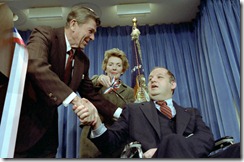Gabrielle Giffords: When The Media Blows It
When many major news organizations reported the death of Rep. Gabrielle Giffords (D-AZ) on Saturday afternoon, it was just one in a long line of major media mistakes.
In 2004, The New York Post splashed John Kerry’s Vice Presidential choice on its front page: “Dem picks (Dick) Gephardt,” blared the headline. Except he didn’t. John Edwards got the nod.
In 2000, most major news networks called Florida for Al Gore. Then they retracted the call. Then they called Bush the winner. Then they retracted that call.
In 1981, President Reagan’s spokesperson, James Brady, was declared dead by news networks after being hit by one of John Hinkley’s bullets. He’s still alive.
Remember President Thomas E. Dewey? In 1948, The Chicago Tribune named him the winner of the presidential election. He wasn’t. Harry Truman was elected to a full term.
These are just four examples – the list of incorrect media stories could include hundreds of others.
During a fast-moving media event, journalists are under enormous pressure to report the latest information. That means they occasionally get a key fact wrong, rely on a misinformed source, or report the same incorrect news that other journalists are reporting.
Since the media so often gets it wrong, that means it’s up to you – the corporate or government spokesperson – to get the story right during a crisis.
If you’re a media spokesperson during the early hours of a crisis and the media is getting it wrong, it’s up to you to remind them to slow down by saying something such as:
“I’ve seen numerous erroneous reports in the media. Contrary to those reports, Rep. Giffords is alive and in surgery. The hospital is planning to hold a press conference within the next hour to offer an update on her condition. I’d ask you to refrain from speculation in the meantime.”
On Saturday, Deputy Rich Kastigar of the Pima County Sheriff’s Department did a great job of reminding reporters that this was a fast-moving story, that there were overlapping press conferences, and that reporters should crosscheck the information from both to ensure accuracy.
That’s the exact right approach. Instead of merely hoping that reporters get the story right, it’s incumbent upon spokespersons to help ensure they do.






Brad,
Brilliant post and you’re spot on.
I’m reposting around the horn, and thank you for taking your time to write a piece that is both insightful and inspiring.
Your new fan,
robbie vorhaus
http://about.me/vorhaus
Sorry, but I disagree about the conclusion of this piece. While it is correct to say that the corporate or government spokesperson should get the story right during a crisis, it certainly NOT that spokesperson’s job to rein in excitable reporters.
It is the job of the REPORTERS to be responsible and level-headed enough not to get carried away in the heat of the breaking story. They shouldn’t NEED to be reminded of their responsibilities by others!
Hi Paul,
Thank you for you comment, and no need to apologize – spirited debate is a good thing!
While I agree with you that reporters should be responsible in their reporting, this piece makes clear that that doesn’t always happen. Therefore, spokespersons can take a proactive role in shaping their own coverage, which I would argue is a wise choice.
Thanks again, and hope you’ll visit the blog again soon.
Brad